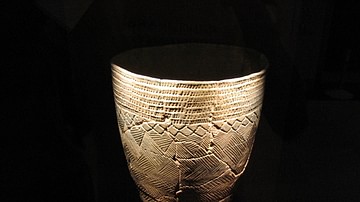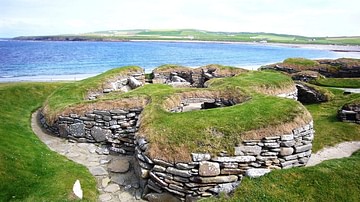Search
Search Results

Definition
Lepenski Vir
Lepenski Vir (Serbian Cyrillic: Лепенски Вир, “Lepena Whirlpool”) is an ancient settlement on the banks of the Danube in eastern Serbia; more precisely, in Boljetin village, near Donji Milanovac. The site shows evidence of a culture which...

Collection
20 Battles of the American Revolution
The American Revolutionary War (1775-1783) was a long and bitter conflict fought between Great Britain and its rebellious thirteen colonies, which were struggling for independence as a new nation, the United States of America. The Americans...

Image
Reconstructed Neolithic Stilt House
Reconstruction of a Neolithic stilt house.
Pfahlbaumuseum Unteruhldingen, Uhldingen-Mühlhofen, Baden-Württemberg, Germany.

Image
Korean Neolithic Pot
A typical pottery bowl from the Korean Neolithic period with pointed base and simple incised decoration. (National Museum of Korea, Seoul, South Korea)

Video
Introduction to the British Industrial Revolution
Did you know that the industrial revolution in Britain is referred to as the first industrial revolution, since that is where it happened first? The British Industrial Revolution was a period of both innovative mechanisation and deep social...

Article
Assassination of Marat
The assassination of revolutionary activist and Jacobin leader Jean-Paul Marat on 13 July 1793 was one of the most iconic moments of the French Revolution (1789-1799), immortalized in Jacques-Louis David's painting Death of Marat. Marat's...

Definition
Louis XVI of France
Louis XVI (l. 1754-1793) was the last king of France (r. 1774-1792) before the monarchy was abolished during the French Revolution (1789-99). An indecisive king, his attempts to navigate France through the crises of the 1780s failed, leading...

Definition
Flight to Varennes
The Flight to Varennes was a pivotal moment of the French Revolution (1789-1799), in which King Louis XVI of France (r.1774-92), his wife Queen Marie Antoinette (1755-93), and their children attempted to escape from Paris on the night of...

Definition
Thermidorian Reaction
The Thermidorian Reaction refers to the period of the French Revolution (1789-1799) between the fall of Maximilien Robespierre on 27-28 July 1794 and the establishment of the French Directory on 2 November 1795. The Thermidorians abandoned...

Definition
Skara Brae
Skara Brae is a Neolithic Age site, consisting of ten stone structures, near the Bay of Skaill, Orkney, Scotland. Today the village is situated by the shore but when it was inhabited (c.3100-2500 BCE) it would have been further inland. Steady...